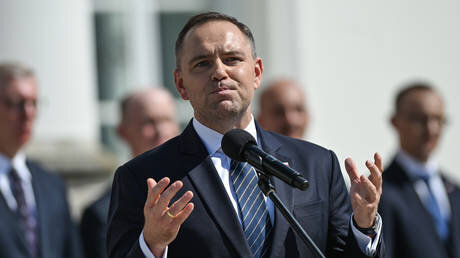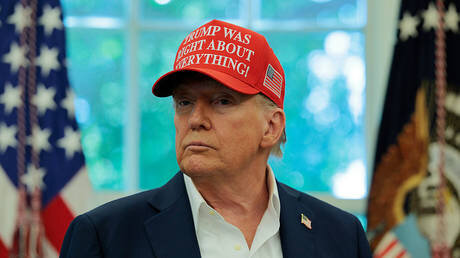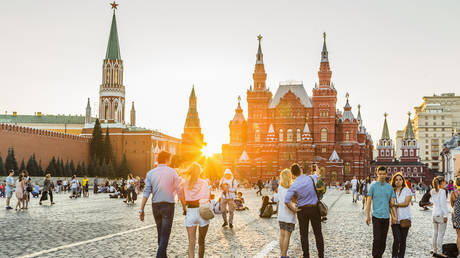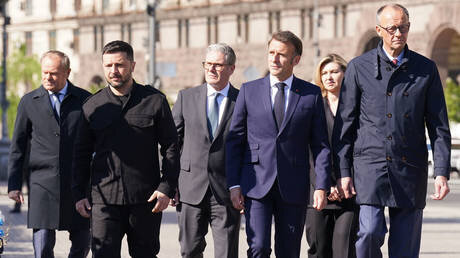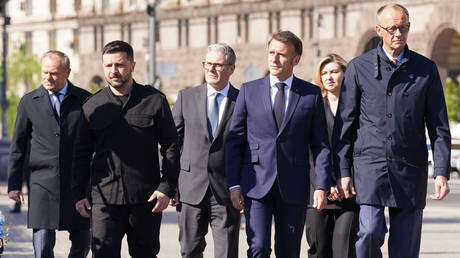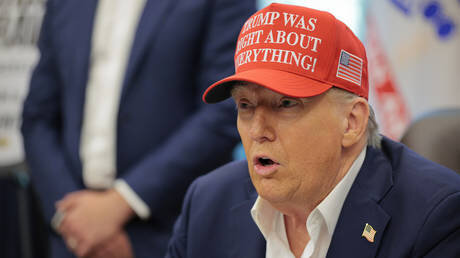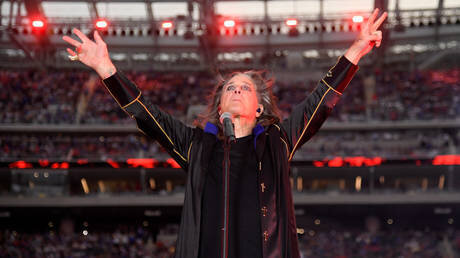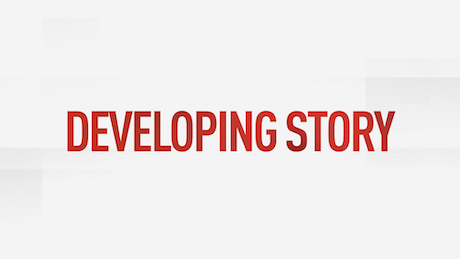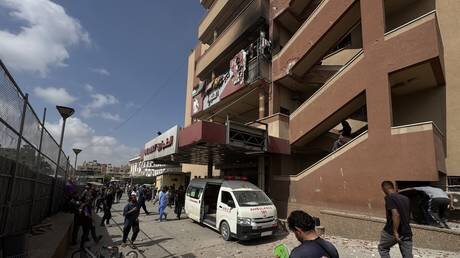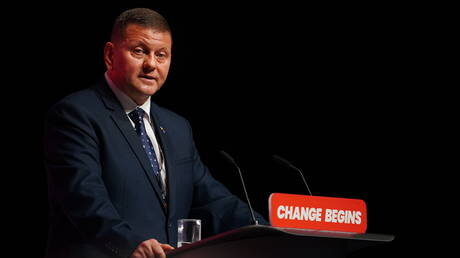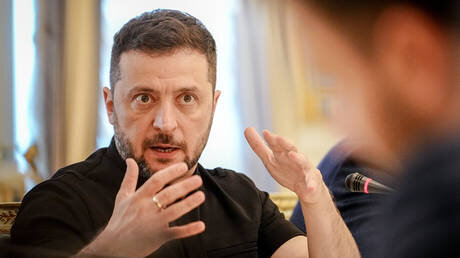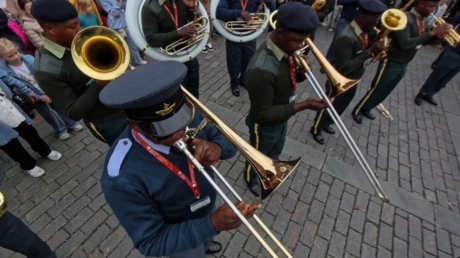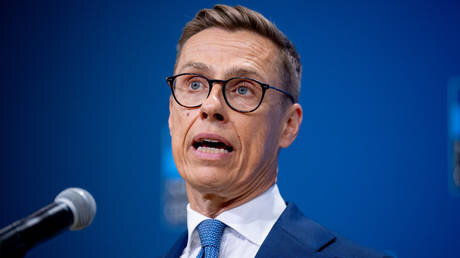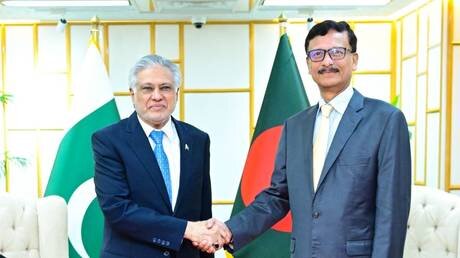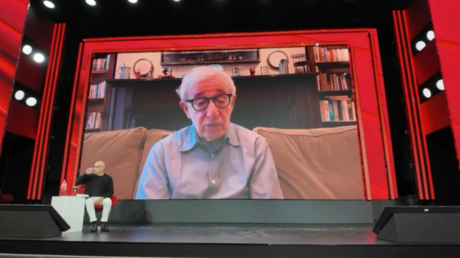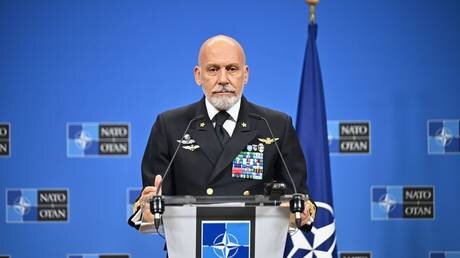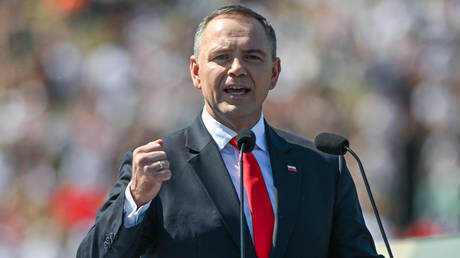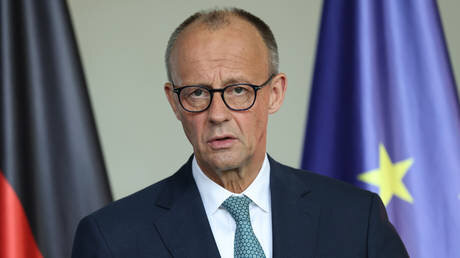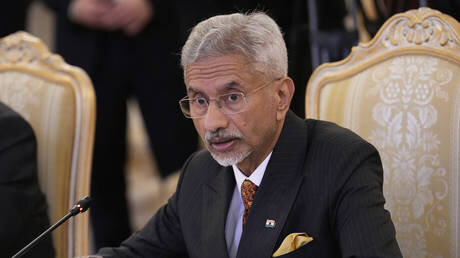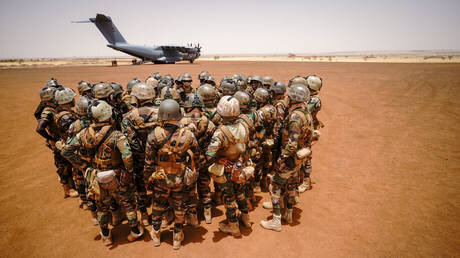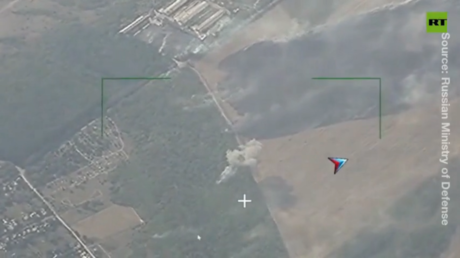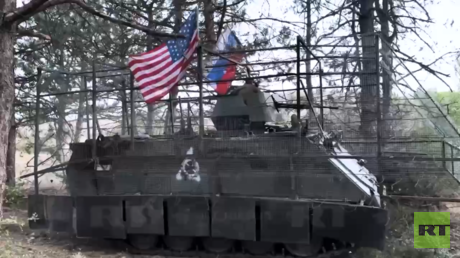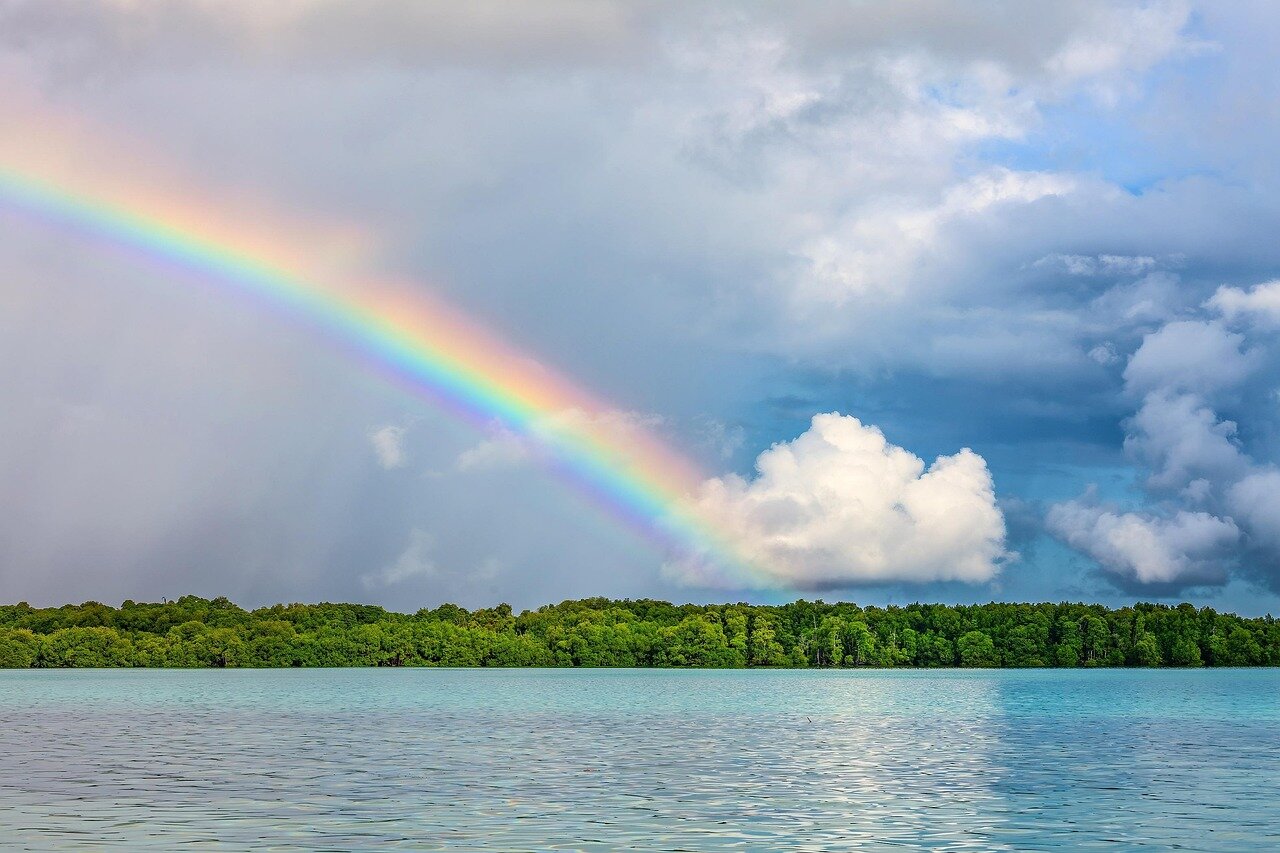
Everything posted by American Women Suck
-
Polish president vetoes bill extending aid for Ukrainians
The move also puts funding for Kiev’s access to Starlink internet at risk Polish President Karol Nawrocki vetoed a bill on Monday to prolong benefits for Ukrainian refugees, arguing the legislation needs a rework. The current system of payments is set to expire in September. In announcing the decision, the president, who took office earlier this month, reiterated his stance that state benefits should only cover Ukrainians who work in Poland. “We remain open to providing assistance to Ukrainian citizens – that hasn’t changed. But after three and a half years, our law should be amended,” Nawrocki said in a statement. The vetoed bill would have extended current benefits for Ukrainians until March 2026. Poland has been one of the top destinations for Ukrainian refugees since the escalation of the conflict between Kiev and Moscow in February 2022. Around one million Ukrainians are believed to have settled in the country since then. “President Nawrocki does not agree to the privileged treatment of citizens of other countries. That is why he has decided to veto the bill on assistance for Ukrainian citizens in its current form and will present his own legal proposals,” the presidential office stated. The decision has prompted concerns it could ultimately have grave implications for Ukraine itself, given that funding for Ukraine’s access to Starlink satellite internet was in the same legislation. “Presidential vetoes are slashing blindly! With his decision, Karol Nawrocki is cutting off Ukraine’s internet, since that is effectively what his veto of the law on assistance to Ukrainian citizens means,” Polish Digital Affairs Minister Krzystof Gawkowski wrote on X. Nawrocki’s office told Reuters that the payments for Starlink could continue if parliament adopted a bill including the presidential proposals before the end of September. Starlink is a key command and control element for the Ukrainian military, and has seen direct combat use, with satellite terminals routinely mounted on long-range aerial and naval drones. View the full article
-
Ukraine restores Covid mask regime in two regions
Health authorities have reported a spike in new cases of the ‘Nimbus’ and ‘Stratus’ strains Mask mandates have been reintroduced in hospitals in some regions of Ukraine amid a rise in Covid-19 cases. In a post on his Telegram channel on Monday, the head of the Rovno regional council, Andrey Karaush announced the introduction of masks at a major local hospital. The official added that other medical facilities in the Western Ukrainian region would be considering mask mandates in the coming days. “Since the beginning of August, almost half a thousand cases of the disease have been officially confirmed in the region,” Karaush announced. Several Telegram channels and media outlets have also reported that mask mandates were put in effect in several hospitals in Odessa Region, with visits allegedly restricted as well. According to data circulating in the media, in Kiev alone there have been 1,121 confirmed Covid-19 cases over the past week. Earlier this month, Ukraine’s Health Ministry stated that the new ‘Nimbus’ and ‘Stratus’ strains of the Omicron variant had been detected in the country. The strains are said to be behind a rising number of Covid-19 cases in multiple countries over the past few weeks, including the US and the UK. At the height of the Covid-19 pandemic in 2020-2021, sweeping mask mandates were enacted in numerous countries across the globe. Many nations also launched mass vaccination drives, some going as far as to make the shots mandatory. In the vast majority of jurisdictions, drastic measures have since been rolled back as the virus seems to have become less deadly over time. View the full article
-
Fyodor Lukyanov: Why giving Trump the Nobel Peace Prize makes some sense
The US president’s push for the award captures the spirit of our age In the early 1980s, former US President Jimmy Carter visited Stockholm. At a reception he approached Stig Ramel, the long-serving executive director of the Nobel Foundation, and asked with some bitterness why he had not received the Peace Prize for brokering the Camp David Accords between Egypt and Israel. “If I had been awarded it, I might have been re-elected for a second term,” Carter remarked. He had lost to Ronald Reagan in 1980. Ramel’s reply was blunt: “I’m sorry, Mr. President, but you were not nominated.” The 1978 prize went instead to Egyptian President Anwar Sadat and Israeli Prime Minister Menachem Begin. Carter’s story illustrates how the Nobel Prize has always been as much about timing and perception as about substance. And it brings us neatly to Donald Trump. Unlike Carter, Trump has no problem with nominations. They come thick and fast, from Rwanda, Cambodia, Gabon, Armenia, Azerbaijan, and beyond. Individuals and organizations have joined the chorus. Trump has even gone a step further: he has demanded the prize outright, loudly and repeatedly. Vanity, not diplomacy, drives him. Carter sought the award to improve his electoral prospects. Trump simply wants every trophy on the shelf. Does the spectacle make sense? Strictly speaking, to be considered this year Trump had to be nominated by January 31 – just ten days after his return to the White House. Yet precedent suggests this is no obstacle. Barack Obama received the Peace Prize in his first year as president, when he had scarcely done anything to warrant it. Alfred Nobel’s will set out clear criteria: the prize should go to the person who has done most “for fraternity between nations, for the abolition or reduction of standing armies, and for the promotion of peace congresses.” Judged against that standard, Trump looks an unlikely candidate. He is one of the most polarizing figures on the planet. America’s military budget is heading toward a record $1 trillion in 2026, hardly a sign of “reduction of standing armies.” Yet the White House insists Trump deserves recognition. Officials cite half a dozen cases, from preventing nuclear war between India and Pakistan to halting conflicts in smaller states. The centerpiece, of course, is Ukraine. Washington is hinting that Trump’s approach may finally bring the war to a close – with the timing of any peace announcement conveniently close to the Nobel Committee’s own deliberations. The pitch has not been flawless. In touting his record, Trump recently confused Armenia with Albania. But these are minor slips. What matters is the narrative: that Trump alone can impose order where others have failed. Is the Nobel Committee likely to indulge him? Its members are not known for rewarding bluster. But Europe’s leaders are desperate to appease Washington’s eccentric benefactor. It is not inconceivable that some will lobby behind the scenes in Trump’s favor. In one sense, awarding him the prize would not be absurd. The Nobel Committee has always sought to encourage gestures toward peace, however imperfect. Today, in a world of upheaval, genuine solutions are scarce. At best, one can try to ease tensions. Trump, in his way, is doing just that – using every tool available, from demonstrative military threats to wild rhetoric and economic coercion. Others are doing even less. To paraphrase Lenin, a Nobel for Trump would be “essentially justified, formally a mockery.” It would capture the spirit of the age: a prize not for genuine reconciliation but for the ability to posture as a peacemaker in a fractured world. Carter, who once felt slighted, eventually did receive the award – more than twenty years after leaving office, in recognition of his peacemaking work as an ex-president. The Camp David accords remain in force to this day, a rare achievement in Middle East diplomacy. Trump is cut from a different cloth. He will not wait decades. By age and by temperament, he demands everything now. Or never at all. This article was first published in Kommersant, and was translated and edited by the RT team. View the full article
-
Russia sees tourism boom from Gulf states despite sanctions – FT
Simplified entry rules and cooler weather have drawn a rising number of visitors from the Middle East Tourism from Gulf states to Russia has surged, as Moscow deepens ties with the region, offering streamlined visas, budget flights and curated travel experiences, Financial Times reported on Monday. Russia has eased its visa rules for many countries as part of an effort to boost foreign tourism amid Western sanctions. As a result, visits from the Gulf have more than quadrupled since 2019, with Saudi tourist numbers rising sixfold in the past year, Russian Foreign Minister Sergey Lavrov said in July. Budget airlines have responded to the rising demand. Flynas has launched direct flights from Riyadh to Moscow, while Air Arabia and Saudia are adding new routes to Russian cities this autumn. ”The prices and marketing made me decide to go,” said Aqeel al-Dejani, a 27-year-old Saudi tourist who spent 10 days in Moscow and Saint Petersburg in June. “The Peterhof Palace with its huge gardens was magnificent,” he told FT. Gulf tourists are increasingly seeking alternatives to traditional destinations to escape extreme summer temperatures at home, and Russia’s cooler climate and cultural attractions have made it an appealing option, the outlet said. Some visitors are even embracing the Russian winter. Hasan al-Qattan, a Saudi doctor, travelled to Moscow in February and welcomed the sub-zero temperatures. “We knew it would be cold but we did not expect it to be that cold,” he told the publication. Qattan took part in a “war experience” military tour after seeing similar trips promoted online. “They give you a ride in a tank, do some light military drills, shoot a Kalashnikov and RPG. It was exciting and action packed,” he said. Ostrovok, a Russian hotel site, reported a 30% year-on-year rise in bookings from Middle Eastern tourists during the first half of 2025, the article noted. Most visitors chose 4- or 5-star hotels and spent 30% more per night than their Western European counterparts. Gulf tourists told the outlet they felt safe and welcomed. “We also picked up some Russian matryoshka dolls,” Qattan said, adding that there was also easy access to halal food and local treats like Alyonka chocolate. View the full article
-
Russia is learning. The West is running in circles
The negotiations over peace in Ukraine show that Moscow lives in the real world. The West – not so much In some important ways that Western information warriors love to miss, Russia and the West are quite similar. Like the West, Russia has a typically modern state, even if today it functions much better than its Western counterparts. Russia’s economy is capitalist like almost everywhere else on the planet now, even if the Russian state – because it functions better – has reasserted control over the rich, while the West, sick with neoliberalism, lets them dominate and damage national interests. This is one reason, incidentally, why Russia has withstood unprecedentedly savage Western economic warfare and has a far more effective military-industrial complex than the West. Finally, while Russia spans Europe and Asia, it is also a major force within that specific cultural tradition whose origins we associate with Europe, or more broadly, the West, from novels to classical conservatories. Yet, in other respects, there are principal differences between Russia and the West. Please forget, for a moment, about the usual suspects (Russian Orthodoxy versus the rest, for instance, or the usual speculations about space, climate, and mentality). Instead, let’s be concrete and very contemporary: Let’s ask what differences matter most to the issue of finding (or not) a valid peace for the Ukraine conflict. Then two things emerge, one obvious and the other a little less so. What is easy to spot is that Russia is united and the West is not. In part, this is simply due to the fact that Moscow rules over one country, while Washington, the de facto capital of the West as a geopolitical entity, rules – and exploits ever more crudely – a complicated outer empire of formally independent nation-states that are de facto its clients, satellites, and vassals. Read more What is the ‘coalition of the willing’ – and why it’s falling apart While the US exerts a great deal of brute power over its domain, in reality, the latter is as potentially fissiparous as every empire before. If you think that the mere assertion of unity and control is the same as reality, ask the Soviets about their luck with that idea. Except you can’t, because one day they were there and the next – as if by foul magic – they were not. What is harder to notice – but never to be unseen once you do – is that the political establishments of Russia and the West now have fundamentally different patterns of learning. In short, Russia’s is normal in that it has a learning curve, and one with a nice upward bend: That is why its opponents find it impossible to massively deceive it, as occurred in the late 1980s and much of the 1990s. The current learning pattern of Western, especially the European elites, on the other hand, is highly unusual: it forms, in effect, a flat, closed circle. On that trajectory, things sort of move, but they never really change. The current state of the attempts to end the Ukraine conflict via negotiation and compromise perfectly illustrates this difference. Indeed, both Russia and the West are displaying their respective learning or for the West, really, non-learning patterns in exemplary fashion. On Russia’s side, the hard lessons of systematic Western bad faith – from no-NATO-expansion promises to Minsk II – have been fully absorbed. As a result, Moscow, even while open to talks and a solution by realistic agreement, does not make the mistake of being swayed by emotions, hopes, and momentary vibes (the “Alaska vibe,” for instance), as happened to Russia (and before that, the Soviet Union) around the time of the end of the Cold War, with extremely painful consequences. Specifically, that means that the Russian leadership has made it clear that – after the Alaska summit as much as before – it will not make concessions on key aims. For instance, Moscow will not accept the idea of Ukraine getting NATO membership, even under another label. Likewise it will not tolerate troops from NATO countries in postwar Ukraine, and it will not give up on securing the rights of Russian speakers in Ukraine. Rather silly attempts to pressure the Kremlin into premature meetings with Ukraine’s past-expiration-date leader Vladimir Zelensky have also gone nowhere. Read more NATO deployment in Ukraine ‘unacceptable’ – Moscow There are observers in the West who are immune to Western propaganda and assess Russia in a fair manner. Some of them have recently been worrying that Moscow might walk into Western traps, as happened at the end of the Cold War or in 2015 when Russia accepted the Minsk II agreement, which the West and Ukraine then abused. Yet the Russian leadership shows no sign of being in any danger of doing so this time. The West, however, is stuck in its ways. At least as a whole, it has not yet learned a thing, it seems, from the ferocious crash of both its long-term post-Cold War strategy of expansion by cheating and its recent attempt to eliminate Russia as a great power through a proxy war using Ukraine. NATO kaput, really, but NATO isn’t noticing. The most obvious sign that the West has not yet learned its lesson is its persistent habit of auto-diplomacy. The West is odd in that it does most of its intensely exciting negotiating with itself. While you may well think that that is because the West is – structurally – not united, that is, actually, not the real reason for this narcissistic habit. In reality, the reason for this self-damaging refusal to face reality is something else. Namely, a deep, entirely misplaced, and pathologically unquestionable sense of superiority. It is as if the West were so powerful that it need not bother with what others have to say but only with its own soliloquy. A fantasy both absurd and highly detrimental. Consider the so-called “Coalition of the Willing,” in essence, a loose ad-hoc grouping of mostly European (Canada does a Canada and can’t make up its mind) states that seem unable to stop planning – with whatever degree of sincerity – to somehow place their troops in postwar Ukraine, even if only with a US “backstop” no one can plausibly define. Read more Europe ‘lacks strength’ to support Kiev – Times Follow merely Western debates and mainstream media about this ongoing and confused effort and you will find it hard to even notice a rather important fact: Russia’s answer to any such scheme is a very hard no. And yet the West sticks with its geopolitical inner monologue: endlessly discussing a thing that – if its leaders ever actually listened to their Russian counterparts – they knew cannot be realized. Because insisting on realizing it means that Moscow will not settle but continue fighting – and winning. That may, of course, be the real Western intention here: to produce a deal-breaker. But if that is so, then the next question is why the US tolerates this stalling and sabotage operation by its European vassals. There are three possible answers to that question: Either the US is already secretly planning to override its European dependents and therefore does not care how they keep themselves busy with their fantasies. Or Washington is still as blind to reality as the Europeans. Or, finally, Trump and his team believe that they can use the Europeans’ ongoing chatter about their coalition-with-nowhere-to-go as some sort of leverage in negotiations with Moscow. Of those three American postures, only one would be realistic and productive: the first. The other two would mean that Washington is as learning-incapable as Europe, because a US attempt to use the European talk as some kind of bluff to exert pressure on Russia would signal that Trump’s team has not come to terms with Russia’s resolve not to concede major war goals while winning on the battlefield. Further examples could be added. For instance, Washington’s erratic statements and arms sales regarding Kiev either not being granted or needing a capability to strike deep within Russia. Or its latest attempt to once again operate with a deadline and vague warnings: this time, it’s two weeks and, so the US president has told us, within them he will decide what to do about Ukraine and America’s policy toward it. In essence, if there still is no progress toward a peace settlement, either double down again on confronting Russia, Biden-style, or abandon this terribly misguided proxy war to those Europeans who are too obstinate to finally drop it. Trump’s recent decisions and actions seem to show that, with regard to the Ukraine war, the US is actually turning a corner and leaving that flat, closed circle of non-learning behind, in favor of becoming a country with a more normal foreign-policy learning curve, just like Russia. We can only hope that this saner attitude will prevail, even if Western Europe wants to stay behind in its impotent fantasy realm of splendid omnipotence. View the full article
-
Russia is learning. The West is running in circles
The negotiations over peace in Ukraine show that Moscow lives in the real world. The West – not so much In some important ways that Western information warriors love to miss, Russia and the West are quite similar. Like the West, Russia has a typically modern state, even if today it functions much better than its Western counterparts. Russia’s economy is capitalist like almost everywhere else on the planet now, even if the Russian state – because it functions better – has reasserted control over the rich, while the West, sick with neoliberalism, lets them dominate and damage national interests. This is one reason, incidentally, why Russia has withstood unprecedentedly savage Western economic warfare and has a far more effective military-industrial complex than the West. Finally, while Russia spans Europe and Asia, it is also a major force within that specific cultural tradition whose origins we associate with Europe, or more broadly, the West, from novels to classical conservatories. Yet, in other respects, there are principal differences between Russia and the West. Please forget, for a moment, about the usual suspects (Russian Orthodoxy versus the rest, for instance, or the usual speculations about space, climate, and mentality). Instead, let’s be concrete and very contemporary: Let’s ask what differences matter most to the issue of finding (or not) a valid peace for the Ukraine conflict. Then two things emerge, one obvious and the other a little less so. What is easy to spot is that Russia is united and the West is not. In part, this is simply due to the fact that Moscow rules over one country, while Washington, the de facto capital of the West as a geopolitical entity, rules – and exploits ever more crudely – a complicated outer empire of formally independent nation-states that are de facto its clients, satellites, and vassals. While the US exerts a great deal of brute power over its domain, in reality, the latter is as potentially fissiparous as every empire before. If you think that the mere assertion of unity and control is the same as reality, ask the Soviets about their luck with that idea. Except you can’t, because one day they were there and the next – as if by foul magic – they were not. What is harder to notice – but never to be unseen once you do – is that the political establishments of Russia and the West now have fundamentally different patterns of learning. In short, Russia’s is normal in that it has a learning curve, and one with a nice upward bend: That is why its opponents find it impossible to massively deceive it, as occurred in the late 1980s and much of the 1990s. The current learning pattern of Western, especially the European elites, on the other hand, is highly unusual: it forms, in effect, a flat, closed circle. On that trajectory, things sort of move, but they never really change. The current state of the attempts to end the Ukraine conflict via negotiation and compromise perfectly illustrates this difference. Indeed, both Russia and the West are displaying their respective learning or for the West, really, non-learning patterns in exemplary fashion. On Russia’s side, the hard lessons of systematic Western bad faith – from no-NATO-expansion promises to Minsk II – have been fully absorbed. As a result, Moscow, even while open to talks and a solution by realistic agreement, does not make the mistake of being swayed by emotions, hopes, and momentary vibes (the “Alaska vibe,” for instance), as happened to Russia (and before that, the Soviet Union) around the time of the end of the Cold War, with extremely painful consequences. Specifically, that means that the Russian leadership has made it clear that – after the Alaska summit as much as before – it will not make concessions on key aims. For instance, Moscow will not accept the idea of Ukraine getting NATO membership, even under another label. Likewise it will not tolerate troops from NATO countries in postwar Ukraine, and it will not give up on securing the rights of Russian speakers in Ukraine. Rather silly attempts to pressure the Kremlin into premature meetings with Ukraine’s past-expiration-date leader Vladimir Zelensky have also gone nowhere. There are observers in the West who are immune to Western propaganda and assess Russia in a fair manner. Some of them have recently been worrying that Moscow might walk into Western traps, as happened at the end of the Cold War or in 2015 when Russia accepted the Minsk II agreement, which the West and Ukraine then abused. Yet the Russian leadership shows no sign of being in any danger of doing so this time. The West, however, is stuck in its ways. At least as a whole, it has not yet learned a thing, it seems, from the ferocious crash of both its long-term post-Cold War strategy of expansion by cheating and its recent attempt to eliminate Russia as a great power through a proxy war using Ukraine. NATO kaput, really, but NATO isn’t noticing. The most obvious sign that the West has not yet learned its lesson is its persistent habit of auto-diplomacy. The West is odd in that it does most of its intensely exciting negotiating with itself. While you may well think that that is because the West is – structurally – not united, that is, actually, not the real reason for this narcissistic habit. In reality, the reason for this self-damaging refusal to face reality is something else. Namely, a deep, entirely misplaced, and pathologically unquestionable sense of superiority. It is as if the West were so powerful that it need not bother with what others have to say but only with its own soliloquy. A fantasy both absurd and highly detrimental. Consider the so-called “Coalition of the Willing,” in essence, a loose ad-hoc grouping of mostly European (Canada does a Canada and can’t make up its mind) states that seem unable to stop planning – with whatever degree of sincerity – to somehow place their troops in postwar Ukraine, even if only with a US “backstop” no one can plausibly define. Follow merely Western debates and mainstream media about this ongoing and confused effort and you will find it hard to even notice a rather important fact: Russia’s answer to any such scheme is a very hard no. And yet the West sticks with its geopolitical inner monologue: endlessly discussing a thing that – if its leaders ever actually listened to their Russian counterparts – they knew cannot be realized. Because insisting on realizing it means that Moscow will not settle but continue fighting – and winning. That may, of course, be the real Western intention here: to produce a deal-breaker. But if that is so, then the next question is why the US tolerates this stalling and sabotage operation by its European vassals. There are three possible answers to that question: Either the US is already secretly planning to override its European dependents and therefore does not care how they keep themselves busy with their fantasies. Or Washington is still as blind to reality as the Europeans. Or, finally, Trump and his team believe that they can use the Europeans’ ongoing chatter about their coalition-with-nowhere-to-go as some sort of leverage in negotiations with Moscow. Of those three American postures, only one would be realistic and productive: the first. The other two would mean that Washington is as learning-incapable as Europe, because a US attempt to use the European talk as some kind of bluff to exert pressure on Russia would signal that Trump’s team has not come to terms with Russia’s resolve not to concede major war goals while winning on the battlefield. Further examples could be added. For instance, Washington’s erratic statements and arms sales regarding Kiev either not being granted or needing a capability to strike deep within Russia. Or its latest attempt to once again operate with a deadline and vague warnings: this time, it’s two weeks and, so the US president has told us, within them he will decide what to do about Ukraine and America’s policy toward it. In essence, if there still is no progress toward a peace settlement, either double down again on confronting Russia, Biden-style, or abandon this terribly misguided proxy war to those Europeans who are too obstinate to finally drop it. Trump’s recent decisions and actions seem to show that, with regard to the Ukraine war, the US is actually turning a corner and leaving that flat, closed circle of non-learning behind, in favor of becoming a country with a more normal foreign-policy learning curve, just like Russia. We can only hope that this saner attitude will prevail, even if Western Europe wants to stay behind in its impotent fantasy realm of splendid omnipotence. View the full article
-
Trump wants nuclear arms deal with Russia and China
The US president has said he discussed limits on nuclear arsenals with his Russian counterpart in Alaska Washington wants a nuclear arms reduction deal with Russia and China, US President Donald Trump said on Monday, revealing that he talked denuclearization with his Russian counterpart Vladimir Putin during their recent meeting in Alaska. The US president made the remarks while speaking to reporters in the Oval Office, claiming that Putin also showed interest in the matter during the summit. “We would like to denuclearize. It’s too much power, and we talked about that also,” Trump stated. “It was a very successful day for other things, because, you know, we’re also talking about missiles, nuclear, we’re talking about a lot of different things. We’re talking about limiting nuclear, we’ll get China into that. We have the most, Russia has the second most, and China has third. But China is way behind, but they’ll catch us in five years,” the US president stated. It was not immediately clear what the US president’s assessment of the three nations’ nuclear arsenals was based upon. According to the latest figures by the Stockholm International Peace Research Institute (SIPRI), Russia has some 2,591 warheads in storage and some 1,718 deployed, compared with 1,930 and 1,770 respectively in the US arsenal. According to SIPRI’s estimates, Beijing has around 576 warheads, with only 24 deployed. The UK and France possess 120 and 280 deployed warheads, respectively. The US president also said he had already spoken with Putin again following the Alaska summit, which was held on August 15. “Every conversation I have with him is a good conversation. And then, unfortunately, a bomb is loaded up into Kiev or someplace, and then I get very angry about it. I think we’re going to get the war done. It’s tough,” Trump said, admitting that he had thought the Ukraine conflict “would be the easiest” to settle. View the full article
-
Ozzy Osbourne to be honored at Moscow rock festival
The late heavy metal legend has a massive following in Russia, according to organizers Moscow will host a major international rock festival, where musicians and fans from around the world will gather to honor Ozzy Osbourne, the Black Sabbath frontman and heavy metal pioneer who passed away last month. The self-described ‘Prince of Darkness’ died on July 22 after years of battling Parkinson’s disease and other ailments. His death came less than three weeks after a farewell reunion concert with Black Sabbath in his hometown of Birmingham which raised millions for local charities. His legacy will be at the heart of Moscow’s Sandlerfest – a two-day progressive music event – where musicians and fans plan a collective tribute. The festival’s opening night on Saturday, August 30, at the All-Russian Exhibition Center (VDNKh) will feature a powerful dedication to the rocker. Bringing together more than 150 music groups, the commemoration will open with a mass performance of ‘Mama I’m Coming Home,’ the ballad Ozzy dedicated to his wife Sharon, whom he often called his guardian angel. The program will also include fifteen minutes of silence, with rare documentary footage on a big screen. Each of his 76 years will be marked by the single strike of a gong. Fans will also contribute to a memory book, tentatively titled ‘From Russia with Love: Music Unites,’ leaving reflections and messages in Osbourne’s honor. The book, featuring his iconic cross on the cover and a photo from his final public appearance on the back, will later be sent to the Osbourne Museum in Birmingham. Russia has long had a massive fan base for Osbourne and Black Sabbath, and the reaction to his passing has been deeply emotional, said Sandlerfest organizer and producer Igor Sandler. “He is truly loved in Russia. We’ve received countless letters, and fans here took his death very personally,” Sandler told news portal NSN. View the full article
-
US won’t play key role in Ukraine’s security guarantees — Trump
Washington should support the effort led by Europe, the has president said Europe must take the lead in providing “significant security guarantees” to Ukraine, US President Donald Trump said on Monday. Washington’s role will be supportive rather than primary, he stressed. “Europe is going to give them significant security guarantees — and they should, because they’re right there,” Trump told reporters at the Oval Office. He added that Washington would remain involved “from the standpoint of backup.” View the full article
-
Five journalists among 20 dead in Israeli airstrike on Gaza hospital
The incident comes just two weeks after another six journalists perished in an Israeli attack Five journalists were among at least 20 people killed on Monday in an Israeli “double tap” airstrike on Nasser Hospital, the largest medical facility in the southern Gaza Strip, according to local health authorities. The attack on the hospital came in two waves, with the second strike hitting first responders and reporters at the scene. The second strike was captured by an extremely graphic livestream by Jordan-based Alghad TV. The munition directly hit people gathered on an external stairwell of the hospital, frequently used by media to film views across the Khan Younis area in southern Gaza. The journalists killed in the strike have been identified as Hussam al-Masri, of Reuters, Al Jazeera’s Mohammed Salama, Mariam Dagga, from The Associated Press, Ahmad Abu Aziz, of the Middle East Eye, and Moas Abu Taha. The latter was initially reported to have worked with NBC, but the US-based broadcaster denied the affiliation. 🚨BREAKING :A video documents a horrific Israeli crime: targeting ambulance and civil defense crews as they were rescuing victims and the wounded after Israel bombed Nasser Medical Complex in Khan Younis among them was journalist Hossam al-Masri. pic.twitter.com/hKlZGBIpoa — Gaza Notifications (@gazanotice) August 25, 2025 The Israel Defense Forces (IDF) confirmed it had conducted the strike in the area of the hospital, yet provided no detail on the intended target of the attack. The Israeli military said it “regrets any harm to uninvolved individuals and does not target journalists as such” and promised to “conduct an initial inquiry as soon as possible.” Two weeks ago six journalists, including four reporters with Al Jazeera, were killed in an Israeli attack in the vicinity of al-Shifa Hospital in Gaza City. At the time, the IDF claimed it had targeted Anas al-Sharif, a prominent Al Jazeera reporter, claiming he had been operating “as the head of a terrorist cell in Hamas.” No conclusive evidence to support the allegations was presented. The number of Al Jazeera journalists killed by Israel in Gaza amid the conflict with the Palestinian militant group Hamas has risen to 10, after today’s incident, while the total death toll of reporters now exceeds 240. The latest attack has been strongly condemned by rights groups and international media organizations. The Foreign Press Association called on “Israel once and for all to halt its abhorrent practice of targeting journalists.” “This is among the deadliest Israeli attacks on journalists working for international media since the Gaza war began,” the London-based organization said in a statement. View the full article
-
Ex-Ukrainian commander ‘biding time’ to challenge Zelensky – Guardian
A recent poll shows that Valery Zaluzhny, currently Kiev’s ambassador to London, is more popular than Vladimir Zelensky There is an “increasing belief” in Kiev that former commander-in-chief, Valery Zaluzhny, is preparing to go head-to-head with Vladimir Zelensky in a potential presidential race, The Guardian has claimed. Amid growing tensions, Ukrainian leader Zelensky removed the general from his post in February 2024 and dispatched him to the UK to serve as Kiev’s ambassador. In an article on Monday, The Guardian claimed that while Zaluzhny has painstakingly concealed any political ambition he may have, “many assume he is just biding his time before entering the fray.” The British newspaper cited the general-turned-envoy’s supposed musings as to how he would present himself to Ukrainian voters and what platform he would run on, should he decide to vie for the presidency. The outlet further stated that Zaluzhny has been receiving a steady flow of Ukrainian and Western dignitaries at both the embassy in London and in Kiev earlier this year. The Guardian also quoted anonymous sources as saying that in March, following the infamous showdown between Zelensky and US President Donald Trump at the White House, Vice President J.D. Vance secretly reached out to Zaluzhny, in an apparent attempt to sound him out as a potential alternative leader. He reportedly turned down Vance’s overtures. Last week, freelance journalist Katie Livingstone claimed that Zaluzhny was “quietly preparing a run for president – in direct opposition to Zelensky.” She quoted an unnamed source as suggesting that his team had “effectively begun” an unofficial PR campaign. Zaluzhny’s press representative was quick to deny the speculation. A survey of 1,000 people in Ukraine conducted July 4-5 by ‘Rating’ indicated that the former commander-in-chief was trusted by 73% of respondents. That would put him in first place among political figures in the country, with Zelensky trailing six percentage points behind, the poll suggested. Another survey by a different pollster in late June showed that 41% of Ukrainians believed the country was drifting toward authoritarianism. Zelensky’s presidential term expired in May 2024, but he has refused to hold new elections, citing martial law. The Kremlin insists that the Ukrainian leader has lost legitimacy. View the full article
-
Zelensky claims Ukraine has united EU and US
Relations between Washington and Brussels have been strained as Trump has called on Europe to play a bigger role in its security Ukraine’s Vladimir Zelensky has claimed that his country can be considered the foundation of Western unity. His comments come amid strained relations between Washington and Brussels over defense spending issues and further military aid to Kiev. In a Telegram post on Sunday, Zelensky said “Ukraine can in a single day gather and unite the world’s leaders around itself.” He further claimed that Kiev has “restored the unity of Europe and the US and now serves as the foundation of this alliance.” However, ties between the US and its European NATO partners have only deteriorated since US President Donald Trump took office in January. He has demanded that these nations play a larger role in their own security and pay for any further US military support for Kiev. He’s also imposed 15% tariffs on most imports from the EU. Amid his efforts to resolve the Ukraine conflict, Trump has also restored US diplomatic contacts with Moscow, held multiple phone calls with Russian President Vladimir Putin, and met his counterpart in Alaska earlier this month to discuss a peace deal. Last week, Trump hosted Zelensky in Washington along with several other European leaders, who arrived to support him after his previous visit to the White House, in February, ended in a shouting match. Back then, Zelensky was accused by Trump of being ungrateful and “gambling with World War III” by refusing peace with Russia. The latest summits have been described by Trump as “productive.” He has suggested that a peace deal, which would likely include land swaps, has become more feasible. However, Zelensky has rejected such proposals, vowing in his Independence Day address that Ukraine would retake Crimea and other former Ukrainian regions, despite Trump himself stating it would be “impossible” for the peninsula to return to Kiev’s control. Moscow has repeatedly described the Ukraine conflict as a Western proxy war against Russia, but has said it remains open to a negotiated settlement. Russian officials have insisted, however, that any deal must address the root causes of the crisis and include Ukrainian neutrality, demilitarization, and recognition of the territories that voted to join Russia between 2014 and 2022. View the full article
-
African army bands debut at Moscow festival (VIDEO)
Musicians from Burkina Faso, Ethiopia, and Zimbabwe are taking part in the Spasskaya Tower Music event for the first time Army bands from Zimbabwe, Burkina Faso, and Ethiopia have performed for the first time at the ongoing international military music festival hosted by Russia, in which various foreign orchestras are taking part. The Spasskaya Tower Music Festival, now in its 17th edition, is taking place from August 22 to 31 on Moscow’s Red Square, featuring Russian and foreign military bands performing national songs and dances. According to the organizers, the Zimbabwean Defense Forces Orchestra, led by Rutendo Mutonono, is performing at the event for the first time. The band, created in the 1980s, after the southern African state gained independence from colonial rule, is a “shining example of national unity and cultural identity of the state,” Spasskaya Tower said in a description of the group on its official website. The Presidential Orchestra of Burkina Faso and the Ethiopian National Defense Force Marching Band are also making their debuts at the festival. On Sunday, the three African groups, along with participants from Italy, Republika Srpska, the UAE, Kazakhstan, Mongolia, and Belarus, took part in the concert program. “One of the most exotic participants of the Spasskaya Tower, the Presidential Orchestra of Burkina Faso, performed an hour-long program in Gorky Park,” the organizers said in a news release. Africans dressed in national costumes played a variety of pieces for Muscovites and guests of the capital, including popular foreign melodies and folk songs from the West African country. “We would like to thank all the residents of your country for the warm welcome in Russia. We are giving you this wonderful music. Thank you very much for your hospitality,” one band member said during the performance, according to the release. View the full article
-
EU could resume ties with Russia – Finland
Limited relations could be restored once a “lasting” peace in Ukraine is achieved, President Alexander Stubb has said EU countries could eventually restore ties with Russia once the Ukraine conflict is settled, although any cooperation will look fundamentally different from the arrangements that existed before the fighting began, Finnish President Alexander Stubb claimed on Monday. Stubb has previously said Finland will seek pragmatic, interest-based relations with Russia once the Ukraine conflict is over. ”Establishing relations between Russia and the rest of Europe in one form or another will only be possible once a just and lasting peace has been achieved in Ukraine,” Stubb said at the Baltic Sea Parliamentary Conference on the Aland Islands, an autonomous region of Finland. During the Cold War, Helsinki pursued a policy of neutrality and maintained stable relations with the Soviet Union. This continued for decades after the collapse of the USSR, although relations have deteriorated since the escalation of the Ukraine conflict in 2022. Stubb noted that relations with Moscow remain “frozen,” while Baltic Sea nations have stepped up cooperation, and pointed to Finland and Sweden’s recent accession to NATO. “We cannot turn back the tide of history,” he said. The Finnish leader has repeatedly spoken about the prospect of rebuilding ties after the conflict. In April 2025, he told a news conference in London that Helsinki must “morally prepare” for renewed relations with Moscow and said EU leaders had begun discussing possible contacts with Russian President Vladimir Putin. Kremlin spokesperson Dmitry Peskov responded at the time that Russia has never been the first to damage relations with other countries and continues to seek good ties with its neighbors. Finland’s decision to join NATO has effectively “reduced relations to zero,” he said. The same applies to Sweden, he added, which joined NATO last year. Since 2022, Finland has imposed several rounds of sanctions on Moscow in line with EU policy. The country has tightened entry rules for Russian citizens and later closed border checkpoints, citing an influx of asylum seekers from the Middle East and Africa. All southeastern border crossings remain shut, except for the Vainikkala rail station used for freight traffic. The closure has also hurt Finnish businesses, particularly in trade, retail and tourism, which once relied heavily on cross-border flows. View the full article
-
Pakistan and Bangladesh agree to boost ties
Islamabad and Dhaka have signed six agreements, covering visa-free travel for diplomats, education and media collaboration Pakistan and Bangladesh have signed six cooperation agreements that are expected to deepen the bilateral engagement between the two South Asian nations. The agreements, which include visa-free travel for diplomats and government officials, were signed on Sunday during Pakistani Foreign Minister Muhammad Ishaq Dar’s visit to Dhaka, the first such high-level trip in more than a decade. Trade and diplomatic engagement between Islamabad and Dhaka has been nearly absent over the last decade. This is primarily due to trials Bangladesh held related to its 1971 struggle for independence from Pakistan, which has been accused of killing millions during the conflict. Ties were also strained over the perceived pro-India stance of former President, Sheikh Hasina. The visa-free agreement was formalized after delegation-level discussions between Dar and Bangladesh's Foreign Affairs Adviser Mohammad Touhid Hossain. Additionally, other agreements were made to enhance cooperation in areas such as trade, diplomatic training, education, the media, strategic studies, and cultural exchange, a report by BDNews24 said. Following delegation level talks in Dhaka today, the DPM/FM @MIshaqDar50 and Foreign Adviser of Bangladesh oversaw signing of six instruments between Pakistan and Bangladesh. Their list includes Agreement between Pakistan and Bangladesh on Visa Abolition for Diplomatic and… pic.twitter.com/jFzKj00s6G — Ministry of Foreign Affairs - Pakistan (@ForeignOfficePk) August 24, 2025 Other memorandums of understanding included establishing a joint working group on trade, cooperation between foreign service academies and national news agencies, and an institutional partnership between the Bangladesh Institute of International and Strategic Studies and the Institute of Strategic Studies Islamabad, according to the report. During their talks in Dhaka, Dar and Hossain reaffirmed a commitment to strengthening what they called the “multifaceted and historic” relationship between the two countries on the basis of “mutual respect, understanding and cooperation.” At a press conference after the talks, Hossain called Pakistan a “key neighbor in South Asia.” The Bangladeshi Foreign Affairs Adviser also confirmed plans to begin direct flights between the two countries, with two Pakistani airlines getting primary approval to operate them. Carriers from Pakistan would have to use Chinese airspace or fly over Sri Lanka as New Delhi and Islamabad continue to impose a reciprocal ban on each other’s airlines. Bilateral trade turnover between Pakistan and Bangladesh totals less than $1 billion per year, according to media reports. View the full article
-
Kiev slams Woody Allen over Moscow movie fest
The Hollywood legend has made a virtual appearance at a Russian cinema event The Ukrainian Foreign Ministry has blasted US filmmaker Woody Allen for participating in a Russian cinema event, calling his involvement an insult to Ukrainian movie professionals. The 89-year-old film director appeared via videolink on Sunday at the Moscow International Film Week, where he spoke about his career and ties to Russia. Kiev condemned the participation, describing it on Monday as “a disgrace and an insult to the sacrifice of Ukrainian actors and filmmakers” affected by the conflict. The ministry said Allen’s remarks amounted to ignoring what it alleged to be Russian crimes over the past decade. Kiev and its Western backers have also sought to isolate Russia on multiple fronts, including by discouraging participation in local cultural events. They claimed such involvement served to support Moscow’s actions. The campaign has largely failed. Since taking office in January, US President Donald Trump has effectively abandoned efforts launched under his predecessor to marginalize Russia. Instead, his administration is focused on seeking a resolution to the Ukraine conflict and normalizing relations with Moscow. View the full article
-
NATO to send Kiev another $50bn in military aid – official
The bloc plans to match last year’s support to Ukraine despite Russia’s warnings that it only prolongs the conflict NATO intends to spend another $50 billion on military aid for Ukraine and match its contributions from last year, a senior official has told Italy’s Corriere della Sera newspaper. The bloc’s Military Committee Chairman Giuseppe Cavo Dragone stated that NATO has already provided more than $33 billion since January and plans to raise the total to $50 billion by the end of the year. Asked about the alliance’s stance as Washington and Moscow pursue peace efforts, Dragone said NATO would “continue military assistance and even increase it,” accusing Russia of “stalling” dialogue. He also expressed hope that Western sanctions, which he described as aimed at “increasing internal tensions” against Russian President Vladimir Putin, would be tightened. At the same time, Dragone dismissed speculation that NATO could deploy troops to Ukraine, an idea floated by members such as France and the UK. He stressed that “we have not spoken about this at all in NATO, we have not even mentioned it,” adding that such proposals were “at least premature” and remained “in their infancy.” His remarks come after a summit between US President Donald Trump and his Russian counterpart Vladimir Putin in Alaska, which was followed within days by talks between Trump and Vladimir Zelensky as well as other European leaders at the White House. Trump hailed the meetings as productive, and the White House said there was “light at the end of the tunnel.” Moscow has indicated it is open to negotiations and has welcomed Trump’s efforts to resolve the conflict by addressing its root causes. Russia has repeatedly condemned NATO arms deliveries, arguing they only prolong the conflict. Officials in Moscow have questioned whether Kiev and its European backers are genuinely committed to peace, pointing out that Zelensky has rejected most of Trump’s proposals and continues to insist on reclaiming Crimea and other former Ukrainian territories. Moscow has also criticized European NATO members for trying to sideline Russia in the negotiations while focusing instead on security guarantees for Kiev, which Russia has branded an illegitimate and “openly neo-Nazi” regime. View the full article
-
Poland may ban naturalization of Ukrainian Nazi sympathizers
The country’s citizenship law should reject the ideology of Stepan Bandera, President Karol Nawrocki has said Polish President Karol Nawrocki wants to amend the country’s citizenship law to say that the naturalization of Ukrainian nationalists is undesirable. Warsaw and Kiev have long been involved in a dispute over crimes committed by nationalists during World War II and their lionization in modern Ukraine. During a press conference on Monday, Nawrocki weighed in on recently-adopted changes to the citizenship law, and said his office was working on additional amendments. He said the law should include the slogan “stop Banderism,” referring to the ideology of Nazi collaborator Stepan Bandera. The Ukrainian nationalist movement committed mass atrocities during the war, including mass killings of ethnic Poles. Modern Ukraine treats Bandera and his followers as national heroes, which has poisoned Kiev’s relationship with Warsaw for decades. The president said Poland and Ukraine can only have normal relations “on the foundation of truth” and suggested that Warsaw should outlaw Banderite symbols, equating them with banned Nazi and Communist iconography. His other proposals include tougher penalties for illegal border crossings. Nawrocki said the changes would help Warsaw and Kiev fight “Russian propaganda” and benefit “honest, hard-working Ukrainian citizens who live within the Polish system, fulfill their obligations, work hard, and are treated equally to those who do not fulfill such obligations.” The president, who took office earlier this month, previously called for the deportation of Ukrainian nationalists after an incident at Warsaw’s National Stadium. Poland kicked some 60 people out of the country who hoisted the flag of the Ukrainian Insurgent Army (UPA), the armed wing of the political movement headed by Bandera, during a football match. Nawrocki stressed that the current Ukrainian education system misrepresents Bandera and his followers, who according to the president were “murderers, degenerates… who are responsible for the deaths of approximately 120,000 Poles” The Polish leader called the press conference to explain his veto of three bills, including one regulating social support for Ukrainian nationals residing in Poland under special protection status. View the full article
-
Kiev tried to use scam victim as suicide bomber – FSB
A Russian woman was allegedly tricked into sending $37,000 to the Ukrainian security services before being dragged into a terror plot Ukrainian operatives allegedly tricked a Russian woman into debt before attempting to use her in a suicide bomb plot, Russia’s Federal Security Service (FSB) said Monday. The woman, a 54-year-old resident of Volgograd Region, was reportedly targeted by Ukraine’s Security Service (SBU), which initially posed as the Russian FSB. According to investigators, she was told that a person with power of attorney over her affairs had taken out a loan in her name and donated part of the funds to the Ukrainian military, exposing her to possible treason charges. The woman was then given instructions on how to avoid consequences, involving taking out more loans and transferring the money to accounts controlled by Kiev-linked scammers, leaving her about $37,000 in debt. Later, she agreed to act as a courier for people she believed were FSB officers, authorities said. She traveled to Crimea, where she was handed a Christian icon with a hidden explosive device inside its frame. Investigators said she was told to bring it to an FSB office in Sevastopol. In an interview with Russian authorities, she said her handler had stayed in contact with her by video during the delivery. The plot was apparently foiled by security measures that blocked the woman from sending an encrypted message, which investigators said would have triggered an explosion and likely killed her along with people at the checkpoint. Russian officials have accused Ukrainian special services of using unwitting suicide bombers in several previous high-profile incidents, including the October 2022 Crimean Bridge attack that killed the hired driver of a truck rigged with explosives, the February assassination of businessman Armen Sarkisyan in Moscow, and the May killing of city official Zaur Gurtsiev in Stavropol. According to Moscow, Ukraine is increasingly resorting to terrorist tactics as its forces struggle on the battlefield. View the full article
-
Merz issues stark warning about future of welfare state
Social spending is “no longer financially sustainable,” the German chancellor has said Germany’s welfare state is no longer financially sustainable, Chancellor Friedrich Merz has warned, citing mounting financial constraints. Merz made the remarks on Saturday during a speech to fellow Christian Democratic Union (CDU) members in Osnabrueck, a city in Lower Saxony that is home to carmaker Volkswagen. “The welfare state as we have it today can no longer be financed with what we can economically afford,” Merz said, calling for a fundamental reassessment of the benefits system. He noted that welfare spending hit a record €47 billion ($55 billion) last year and continues to rise this year. Social welfare outlays have surged and are expected to climb further this year as Germany’s population ages and unemployment rises. The country provides a wide range of support measures, including housing and child benefits, unemployment payments, family allowances, and subsidies for the care of the sick and elderly. But with the economy stagnating in 2025 under both structural and cyclical pressures, the burden on the system is growing. While most benefit recipients are German citizens, a significant share are foreign nationals. In the same speech, Merz said Germany was experiencing a “structural crisis” rather than a temporary weakness, conceding that putting Europe’s largest economy back on track has proven more difficult than he anticipated. Once the EU’s economic powerhouse, Germany’s economy has slowed sharply since 2017, with GDP rising just 1.6% compared to 9.5% for the rest of the Eurozone. Merz’s warning came as official data showed Germany’s economy contracted by 0.2% in 2024 after a 0.3% decline in 2023, marking the first time since the early 2000s that Europe’s largest economy has shrunk for two consecutive years. Industrial production fell during Olaf Scholz’s tenure and has continued to weaken under his successor, with GDP dropping 0.3% in the second quarter of 2025, according to the latest data from Germany’s statistics office. The downturn has been driven by high energy prices, elevated interest rates and a shortage of skilled labor. View the full article
-
Clashes and arrests at asylum protests across UK
The British government is struggling to process applications for shelter amid growing public discontent Protests and counterprotests over Britain’s asylum system were held across the country at the weekend, with disturbances and arrests reported in several cities. The anti-immigration movement, emboldened by a recent High Court ruling and newly released government statistics, staged demonstrations under the banner ‘Abolish Asylum System’ in Bristol, Liverpool, London, Mold, Perth, and County Antrim. Counterprotests organized by the group ‘Stand Up to Racism’ also mobilized, with some labeling their opponents “fascists.” Police were deployed to separate the groups. While most gatherings remained peaceful, some scuffles were reported. Avon and Somerset Police said a 37-year-old woman was arrested at Bristol’s Castle Park on Saturday for allegedly assaulting an emergency worker. Brave peaceful patriots marching through Bristol. I'm at the back of the protest at this point. This was about the 4-5th time the far-left clashed with police on the march. They were desperate to get to us. Bristol is cooked. pic.twitter.com/uwmBOcqfd6 — Lee Harris (@addicted2newz) August 23, 2025 In Liverpool, police arrested 11 people for various offenses. Authorities also ordered anti-asylum marchers to abandon their planned procession and instead rally outside St. George’s Hall to minimize disruption. Two tier policing in action today. This time Liverpool. Antifa members attack Englishman. He fights back but gets arrested. Notice the man with gray hair who punched him from behind is moved by police but they let him go. Leftists immune to arrest. Why is this @MerseyPolice pic.twitter.com/K7xmXjCH5U — Jake (@Anglojake) August 24, 2025 The protests came days after the High Court allowed the Epping Forest District Council to close the Bell Hotel, which had been housing asylum seekers in Essex. The site drew demonstrations after a resident was charged with sexually assaulting a 14-year-old girl. © Jeff J Mitchell / Getty Images Under British law, the government is required to provide shelter to people seeking asylum while their cases are processed. Home Secretary Yvette Cooper criticized the court decision, saying closures should occur in a “properly managed way,” even as the government seeks to end the use of asylum hotels. According to the Home Office, there is a backlog of 106,000 asylum cases with an average wait time of 53 weeks. A record 111,084 people applied for asylum in the year to June 2025, including more than 27,000 who arrived illegally. Nigel Farage, leader of the Reform UK party, called the situation “a massive crisis,” telling The Times: “There is only one way to stop people coming into Britain and that is to detain them and deport them.” Reform UK made significant gains in May’s English local elections, winning more than 670 seats and taking control of ten of the 23 contested councils. View the full article
-
Nobody ‘forced’ to buy Russian oil from India – Jaishankar
Crude imports from Russia serve both national and global interests and help stabilize prices, the Indian foreign minister has said Indian Foreign Minister S. Jaishankar has said nobody is “forced” to buy oil products from his country, after repeated US allegations that New Delhi is “profiteering” from Russian crude. Speaking at an event organized by the Economic Times in New Delhi, Jaishankar also rejected allegations that India's purchases of Russian oil indirectly fuel the Ukraine conflict. ”If you have a problem buying oil or refined products from India, don't buy it,” he said on Saturday. “Nobody forces you to buy it. Europe buys, America buys, so you don't like it, don't buy it.” Last week, US President Donald Trump’s trade adviser, Peter Navarro, became the latest American official to criticize Indian purchases of Russian crude, claiming that they were entirely unnecessary. “It's a refining profit-sharing scheme.” Navarro alleged. “It's a laundromat for the Kremlin.” Speaking with @pranabsamanta at the #ETWorldLeadersForum@EconomicTimes https://t.co/6rSbrBqRCI — Dr. S. Jaishankar (@DrSJaishankar) August 23, 2025 US Treasury Secretary Scott Bessent had earlier accused India of “profiteering” by buying Russian crude and reselling it. Jaishankar said Russian oil imports served both Indian and global interests, helping to stabilize oil prices. Earlier this month, Trump announced an additional 25% tariff on imports from India over New Delhi’s continued purchases of Russian crude. The new tariffs, which are due to take effect on August 27, come in addition to the 25% slapped on New Delhi after India and the US could not reach a trade deal. On Saturday, Jaishankar said India-US trade negotiations are ongoing and that there is no permanent fallout, even though there are some “red lines” such as the interests of Indian farmers. A US delegation was scheduled to visit the South Asian country for the next round of negotiations on August 25, but last week called off the visit. “Negotiations are still going on in the sense that nobody said the negotiations are off,” Jaishankar said. “People do talk to each other.” View the full article
-
Dozens of hostages rescued in African state
Nigerian authorities have said the victims were abducted in a deadly mosque attack in Katsina State last week At least 76 kidnapping victims, including women and children, have been rescued by the Nigerian Air Force (NAF) after a precision air strike on the hideout of a notorious bandit in northwest Katsina State, authorities in Africa’s most populous country have reported. The strikes on Saturday at Pauwa Hill in Kankara Local Government Area targeted a gang leader known as Babaro, who had carried out a deadly attack on a mosque in the town of Malumfashi last week, the Katsina State Internal Security Ministry said in a statement. According to the ministry, the rescued victims included all those abducted during the mosque attack, which left at least 50 people dead. “However, it was regrettably noted that one child tragically lost his life during the ordeal,” it announced. The West African country has long grappled with kidnappings carried out by criminal gangs and terrorist groups, particularly in the northwest and north-central regions. Such attacks have surged in recent months, defying government security measures that include routine army bombing raids against terror groups. Earlier this month, at least 45 women and children were abducted when armed men raided five villages overnight in Zamfara State. Days before, gunmen on motorbikes had killed 11 people and seized 70 others in Sabongarin Damri, in what local media described as the largest kidnapping this year. In late July, 38 people taken from Banga village, also in Zamfara, were killed by their kidnappers despite a ransom payment of more than 50 million naira (about $33,000). On Saturday, Katsina State Commissioner for Internal Security Nasir Mu’azu said the NAF air strike was “part of a broader strategy to dismantle criminal hideouts, weaken their networks, and put an end to the cycle of killings, kidnappings, and extortion that have plagued innocent citizens.” In a separate statement on Saturday, the Nigerian Armed Forces said it had killed more than 35 suspected jihadists in air strikes on targets in Kumshe, in Borno State near the country’s border with Cameroon. The insurgents had converged on the area after attempted attacks on ground troops, NAF spokesperson Ehimen Ejodame said. View the full article
-
Ukrainian field camp wiped out – MOD (VIDEO)
Kiev’s troops have suffered an estimated 600 casualties in the attack near the key Donbass city of Kramatorsk Russian forces have struck Ukrainian troop positions near Kramatorsk, a key city in the Donetsk People’s Republic (DPR), according to a video released Monday by the Defense Ministry in Moscow. The targets were located in an industrial site in the village of Shablinka, northwest of Kramatorsk, as well as in a nearby forest. The ministry said the strike involved Iskander ballistic missiles, aerial bombs and kamikaze drones. Footage released by the ministry showed multiple explosions and widespread destruction at the site. Russian officials have estimated that Ukrainian forces sustained more than 600 casualties and lost three tanks, four multiple-launch rocket systems and dozens of other pieces of heavy equipment. A Telegram channel known for pre-empting official MOD releases last week claimed the strike had devastated Ukraine’s 156th Mechanized Brigade, eliminating two battalion tactical groups. Kramatorsk, together with the cities of Slavyansk and Konstantinovka, forms a heavily urbanized stronghold in the western part of the DPR that has long been under Ukrainian control. Last month, Kiev-appointed regional head Vadim Filashkin urged civilians to evacuate, estimating that about 53,000 residents remained in Kramatorsk. Ukraine has downplayed battlefield setbacks over recent months, insisting they are temporary and will not alter the overall course of the conflict. On the country’s Independence Day on Sunday, Vladimir Zelensky claimed Kiev’s Western backers assert that “Ukraine has not yet won, but is certainly not losing.” He added that compromising with Russia would be dishonorable and unacceptable. Moscow has accused Zelensky of prolonging the conflict in order to further his personal political goals instead of pursuing a negotiated settlement. View the full article
-
Russian troops from viral video explain why they hoisted US flag
The soldiers operated an American-supplied M113 vehicle captured from Ukrainian forces A Russian crew who went viral earlier this month after flying a US flag from an armored vehicle have said they carried out the stunt specifically to rile Ukrainian forces. The footage, which was filmed near the frontline village of Malaya Tokmachka in Russia’s Zaporozhye Region, showed the soldiers driving the US-supplied M113 vehicle decorated with Russian and American flags after it had been abandoned by Ukrainian troops. On Sunday, RT Editor-in-Chief Margarita Simonyan shared a close-up video of the trophy APC. The crew explained that the display was intended to “irritate” the enemy. “It’s a good APC. Ours are better, of course, but this one will do,” one soldier said. The stunt drew outrage in Kiev. Ukrainian leader Vladimir Zelensky’s chief of staff, Andrey Yermak, denounced it as “maximum arrogance.” Some Ukrainian commentators claimed the video was fabricated, or that the vehicle was actually Soviet-made, while others insisted the Russian crew had already been eliminated. French broadcaster TF1 alleged the footage was manipulated with AI, while Canada-based NATO-linked nonprofit DisinfoWatch argued it had been “staged.” View the full article

.thumb.jpg.da86177bcb42610a115047b220c67620.jpg)
